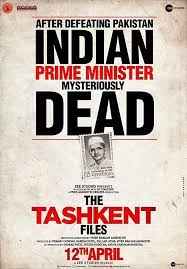‘If your family member goes to a foreign country, and dies there, and you receive his lifeless body, swollen, with blue and white spots, with marks and cuts, do you not even deserve a post mortem?
This ‘family member’ referred to in the movie was the second Prime Minister of India, Lal Bahadur Shastri. It is unthinkable that a post mortem would not be conducted after the death of a Prime Minister, that too when he dies few hours after signing such an important agreement deciding the fate of two countries.
The movie is like a real life Twitter or Facebook or Whatsapp debate. We don’t even have to go as far as social media, we have these discussions in our living room. Both parties feel the other party is completely blinded. Is it just a matter or perception or more? Is lack of evidence an evidence of hidden evidence?
The movie cites enough reasons for us to believe that Shastri ji’s death was a murder. Even if we google on the subject, we will find conspiracy theories. There are books which make compelling references to the alleged murder and cover-up. The movie has collated it all together, and presented in along with the counter arguments. Without giving any spoilers, let me make some quick points.
- 2nd October – Selective History?
A character in the movie says that her child does not even know that Lal Bahadur Shastri Ji was born on 2nd October. The day is known as Gandhi Jayanti. I am sure kids today have no idea that Shastri ji even existed. Our text books growing up were all about Mahatma Gandhi, Pandit Jawaharlal Nehru, Indira Gandhi. There are so many other great people who deserve to be known and applauded.
- International political dynamics
Watch it to know what was happening at that time in the world. Where did India stand in all of this? What if Lal Bahadur Shastri ji was still alive? How corrupt were certain leaders? What if certain people had not been in power? Could things have been different today?
- Performances
Shweta Basu was very good as the lead journalist. This is her best performance till date. I liked her voice, and found her very pretty also. As soon as I saw her, I told my husband:
Yeh to Parwati ki beti hai!
Who? What!
Parvati! Kahaani Ghar Ghar ki!
Interestingly, I have seen Shweta Basu in other movies as an adult. But the first thing that came to my mind when I saw her was the child artist Shruti from the TV serial. Some things never change! Embedded in our memory!
Honestly, I felt other actors, Naseeruddin Shah, Pallavi Joshi, Mandira Bedi, Pankaj Tripathi, Vinay Pathak were just about okay. I also felt that Mithun Chakraborty was a let down. He gave a comic, insincere, shady, uneasy kind of feel to the character. For me, he took away from the credibility of the character. I would have been happy to see Paresh Rawal in this role. The speech he gave on ‘social terrorist’, ‘racist’ was a low point of the movie and lost the intended impact. Achint Kaur had no role.
Overall, despite the flaws, this movie deserves to be watched for the question it raises. Think of it as a research paper that will open a floodgate. People from my parents’ generation may have already known a lot if it. But for those who don’t, it is rather unsettling.
